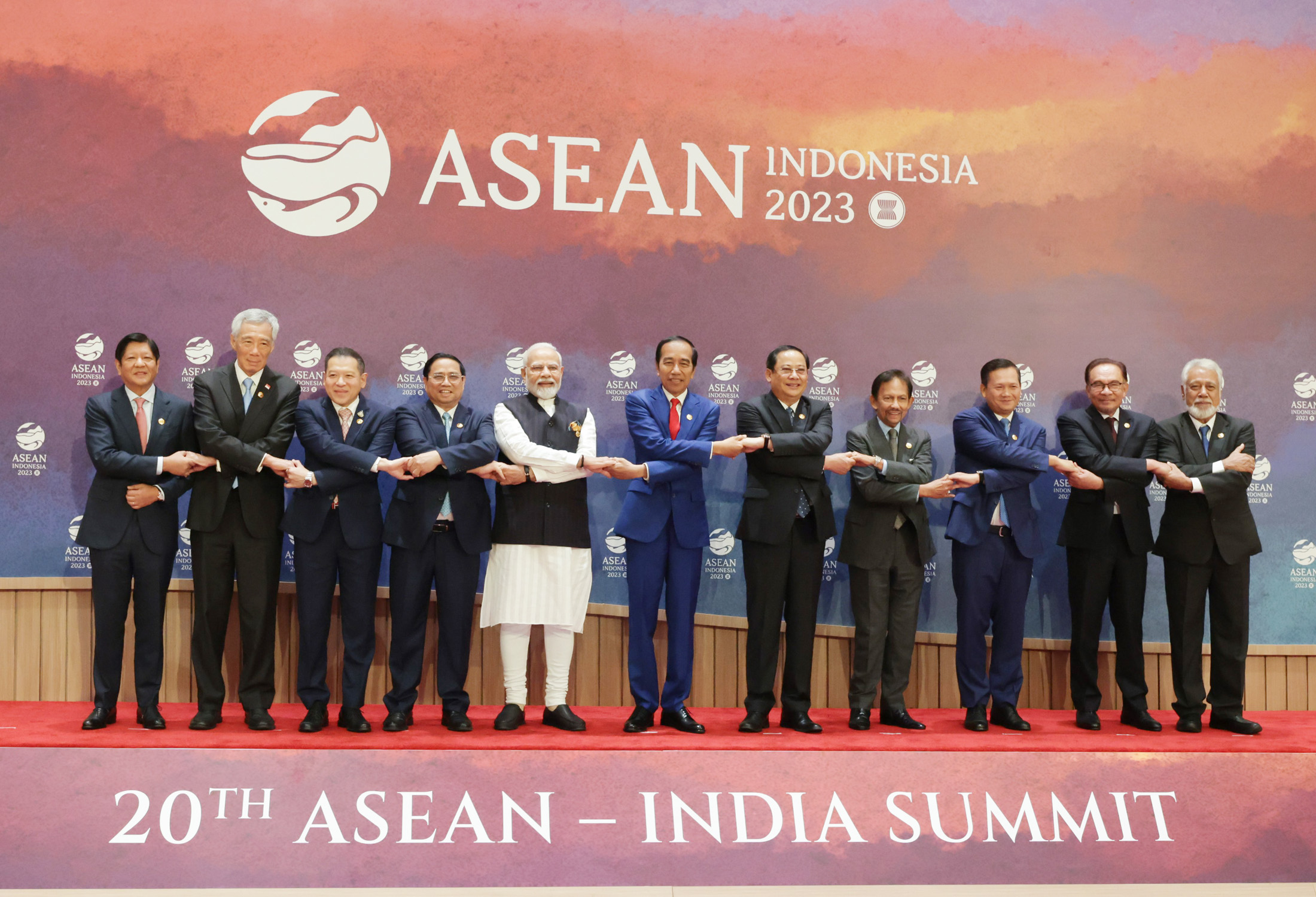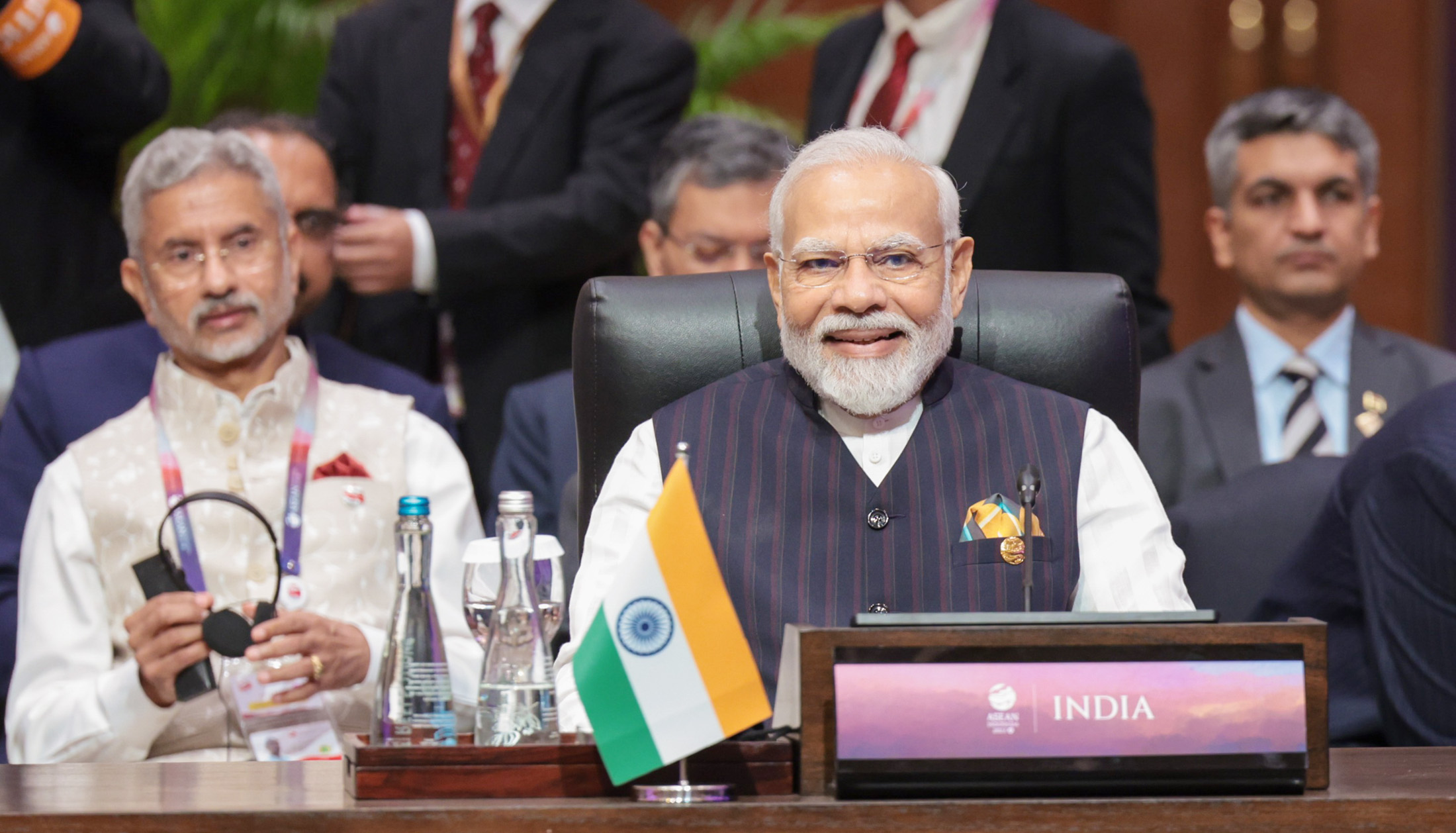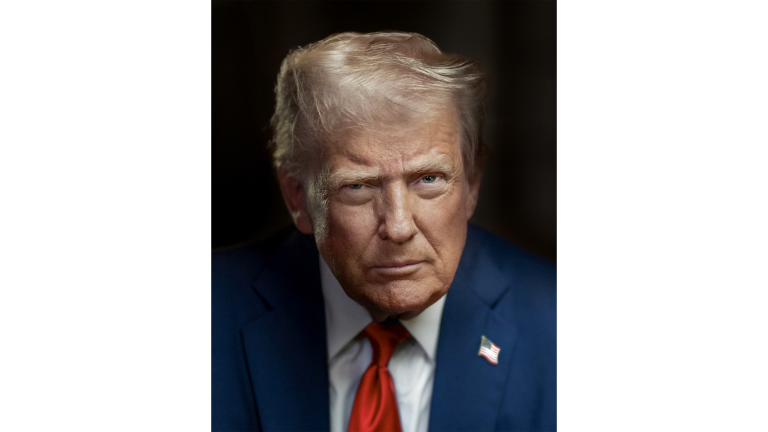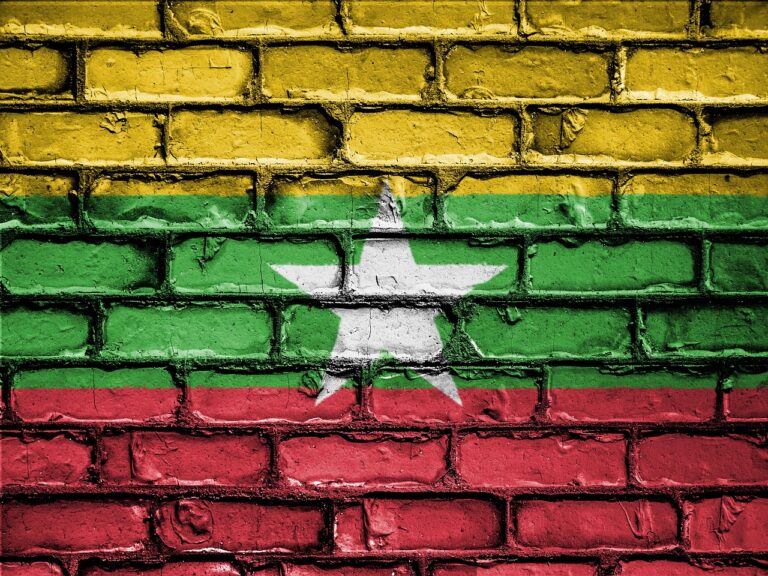
The 18th East Asia Summit in progress in Jakarta on September 07, 2023.
Jakarta: With many of the Association of Southeast Asian Nations (ASEAN) countries as well as Japan upset with China over claiming their respective territories in its recent official map, the member countries and India moved deftly to snub China at the ASEAN Summit here today.
Without mentioning China or the controversial map, Prime Minister Narendra Modi invoked regional groupings such as the Quadrilateral Security Dialogue (QUAD), a strategic group of Australia, India, Japan and the United States, which Beijing is critical of. Modi in his speech highlighted synergies of visions for the Indo-Pacific between India and ASEAN and underscored that ASEAN was the focal point of Quad’s vision. “ASEAN holds a central position in the vision of QUAD. The positive agenda of QUAD complements the various mechanisms of ASEAN,” he said.
Moreover, without naming China, he subtly demolished China’s claims on the South China Sea and stressed the necessity to ensure “peace, stability, freedom of navigation and overflight, and unimpeded lawful commerce in other global sea routes, there. “The need of the hour is such that an Indo-Pacific – where international law, including UNCLOS, is equally applicable to all countries; where there is freedom of navigation and overflight; and where there is unimpeded lawful commerce for the benefit of everyone,” he said.
Interestingly, news agency Reuters reported that Chinese Premier Li Qiang said at the ASEAN Summit today that countries should avoid “taking sides, bloc confrontation and a new Cold War”.

But despite his comments, apparently in a direct snub to China, the Member States of the Association of Southeast Asian Nations (ASEAN) and India, today also issued an ‘ASEAN-India Joint Statement On Maritime Cooperation’, reaffirming the importance of “lawful uses of the seas and unimpeded lawful maritime commerce and to promote peaceful resolutions of disputes”.
“In this regard, we support the full and effective implementation of the Declaration of the Conduct of the Parties in the South China Sea (DOC) and look forward to an early conclusion of an effective and substantive Code of Conduct in the South China Sea (COC) in accordance with international law, including the 1982 UNCLOS,” the joint statement said.
ASEAN countries and India swore by the “universally recognised” principles of international law, including the 1982 United Nations Convention on the Law of the Sea (UNCLOS), and the relevant standards and recommended practices by the International Civil Aviation Organization (ICAO) and the International Maritime Organization (IMO).
It may be mentioned that China has been making sweeping claims of sovereignty over the South China Sea and even refuses to accept a July 2016 ruling by the Permanent Court of Arbitration at The Hague in favour of the Philippines on almost every count. The Philippines had moved the case against China under UNCLOS, of which China itself is a signatory.
According to a June 26, 2023, report by the Center for Preventive Action, a New York-based independent think tank, China has increased its efforts to reclaim land in the South China Sea in recent years by physically increasing the size of islands or creating new islands altogether. “In addition to piling sand onto existing reefs, China has constructed ports, military installations, and airstrips—particularly in the Paracel and Spratly Islands, where it has twenty and seven outposts, respectively. China has militarized Woody Island by deploying fighter jets, cruise missiles, and a radar system,” the report claims.

Modi without naming China in his hard-hitting speech, said: “Any code of conduct for the South China Sea must be consistent with international law, including UNCLOS. In this, the interests of those countries which are not involved in these discussions will also have to be taken care of.”
He further made it clear: “India believes that the Code of Conduct for the South China Sea should be effective and in accordance with UNCLOS.”
Modi said the present global landscape was surrounded by challenging circumstances and uncertainties and identified terrorism, extremism, and geopolitical conflicts as “big challenges for all of us”. He stressed that multilateralism and rules-based international order were essential in countering them, and it was imperative to adhere fully to international laws. He called for “everyone’s commitment and joint efforts” to strengthen the sovereignty and territorial integrity of all countries. “As I have said before – today’s era is not of war. Dialogue and diplomacy is the only path to resolution,” he said.
The Indian Prime Minister, who held extensive discussions with ASEAN partners on further strengthening of ASEAN-India Comprehensive Strategic Partnership and charting its future course, reaffirmed ASEAN centrality in the Indo-Pacific and highlighted the synergies between India’s Indo-Pacific Ocean’s Initiative (IPOI) and ASEAN’s Outlook on the Indo-Pacific (AOIP). He also emphasized the need to complete the review of the ASEAN-India Free Trade Agreement (AITIGA) in a time-bound manner.
Modi presented a 12-point proposal for strengthening India – ASEAN cooperation covering connectivity, digital transformation, trade and economic engagement, addressing contemporary challenges, people-to-people contacts and deepening strategic engagement.
The Indian Prime Minister offered to
- establish multi-modal connectivity and economic corridor that links South-East Asia-India-West Asia-Europe
- share India’s Digital Public Infrastructure Stack with ASEAN partners; renew support to the Economic and Research Institute of ASEAN and East Asia (ERIA) to act as a knowledge partner for enhancing India-ASEAN engagement
- collectively raise issues being faced by Global South in multilateral fora
- share India’s experience in providing affordable and quality medicines to people through Jan-Aushadhi Kendras
He also called for
- an ASEAN-India fund for Digital Future focusing on cooperation in digital transformation and financial connectivity;
- ASEAN countries to join Global Centre for Traditional Medicine being established by WHO in India
- to work together on Mission LiFE [Lifestyle for the Environment]
- collective fight against terrorism, terror financing and cyber-disinformation
- cooperation in disaster management
- enhanced cooperation on maritime safety, security and domain awareness
Modi also invited ASEAN countries to join the Coalition for Disaster Resilient Infrastructure. He further called for a cooperative approach to address global challenges including terrorism, climate change and resilient supply chains for essential items including food and medicines, and for energy security. He highlighted India’s steps in the area of climate change and its initiatives such as the International Solar Alliance, Central Drug Research Institute, Lifestyle for the Environment (LiFE) and the One Sun One World One Grid (OSOWOG).
Besides the joint statement on Maritime Cooperation, another joint statement on Food Security was also adopted by India and ASEAN.
Referring to India’s policy on Myanmar, Modi said India takes into account ASEAN’s views in this regard. He added that as a neighbouring country, ensuring peace and security on the borders, and enhancing India-ASEAN connectivity was also a focus area. “Peace, security, and prosperity in the Indo-Pacific region, is in the interest of us all,” he reiterated.
He also referred to the challenges pertaining to climate change, cyber security, food security, health, and energy, which he said were particularly impacting the Global South. “During our G20 presidency, we are focusing on these important issues related to the Global South,” he said.
In addition to India and ASEAN Leaders, Timor-Leste also participated in the Summit and Prime Minister Modi announced a decision to establish an Indian Embassy in Dili, Timor-Leste. “The decision is a reflection of the importance India attaches to ASEAN, and its relations with Timor Leste,” Modi said. According to India’s Ministry of External Affairs, this decision was warmly welcomed by Timor Leste and ASEAN Members. Timor Leste joined ASEAN in 2022 as an Observor, before becoming its full Member.
– global bihari bureau






A great article, very balanced, to the point and expressing Bharat’s long admired ethos.
Jai Hind